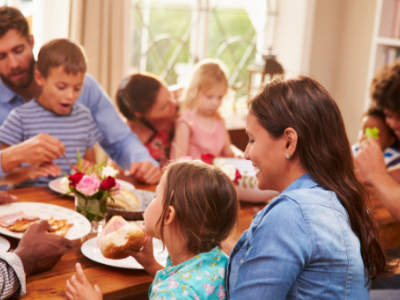
Parenting in God’s big family of faith
'At a time when many parents feel isolated and alone, a supportive church community can provide the kind of practical support and encouragement that modern families desperately need...'
Last time, we traced the story of God’s family from Abraham down to Jesus. Jesus was born into the ‘blessed’ line of Abraham; but he was also the Son of God, who invited all people to join God’s family by faith.
Belonging to God’s family puts our human family into a new perspective.
Growing God’s family
In the Old Testament, conceiving and giving birth to children was a vital expression of God’s blessing. In the very beginning, God commanded Adam and Eve to ‘be fruitful and multiply’ (Genesis 1:28). God also promised to give Abraham many descendants as an expression of his blessing.
Jesus, however, taught that God’s family would no longer grow through the natural birth rate, but would now grow by faith. In fact, Jesus—the only person who ever perfectly lived out God’s purpose on earth—did so without ever marrying or having children. No longer was having biological children the primary way God intended to grow his blessed family.
Jesus encouraged his disciples to focus not so much on getting married and having children (although many of them did that as a matter of course), but rather on growing God’s family by preaching the gospel. Before his ascension, Jesus commissioned them:
‘Go and make disciples of all nations, baptizing them in the name of the Father and of the Son and of the Holy Spirit, and teaching them to obey everything I have commanded you. And surely I am with you always, to the very end of the age.’ (Matthew 28:19–20)
If membership in God’s spiritual family is ultimately by faith alone, we ought to actively encourage our children to put their trust in Jesus. This involves including them in our local church family, praying for them, modelling our own trust in God, and teaching them about God and the forgiveness he offers us in Jesus. Over time, we hope and pray that our children will become children of God by faith.
If the growth of God’s family no longer depends solely on the birth of children, then singleness also takes on a new perspective. The early church leaders still thought that it was good for most people to marry and have children (1 Corinthians 7:8–9, 1 Timothy 5:14). However, both Jesus and Paul taught that singleness can be a positive lifestyle for Christians, enabling them to focus on the task of ‘making disciples’ (Matthew 19:1–12; 1 Corinthians 7:32–35).
Children in God’s family
God expects that all his people, whether married or single, will be part of a local community of faith—a church family. If we are parents, our children will naturally be part of this community with us. The members of our church community can slowly become spiritual brothers and sisters, aunts and uncles, and grandmothers and grandfathers, to us and our children.
In ancient Israel, children were included in the regular festivals, such as the Passover. God instructed his people:
‘When you enter the land that the Lord will give you as he promised, observe this ceremony. And when your children ask you, “What does this ceremony mean to you?” then tell them, “It is the Passover sacrifice to the Lord, who passed over the houses of the Israelites in Egypt and spared our homes when he struck down the Egyptians”.’ (Exodus 12:25–27)
Children were also included in the regular public reading of God’s law: ‘Assemble the people—men, women and children, and the foreigners residing in your towns—so they can listen and learn to fear the Lord your God and follow carefully all the words of this law. Their children, who do not know this law, must hear it and learn to fear the Lord your God’. (Deuteronomy 31:12–13)
In the early Christian church, believers met in their homes for worship and shared meals, which naturally involved their children in the life of the community. Children were probably baptised along with their parents, as a symbol of their membership in God’s family (e.g. Acts 16:30–34).
Whatever we believe about baptism, most Christians agree that our children are part of the community of faith with us. We treat them as children of God and teach them his values, trusting that God will grow and sustain their faith in him into adulthood.
God’s family is characterised by love
The New Testament describes the Christian church as a family, characterised by love. Paul wrote:
‘As we have opportunity, let us do good to all people, especially to those who belong to the family of believers’ (Galatians 6:10)
A few years ago, we experienced this kind of loving community when my husband, Daniel, ended up in hospital for a week. It was not actually a Christian community, but another ‘family’ that my husband is part of—the NSW Police Force. Daniel received phone calls and messages from people of every rank. Several police visited him in hospital and brought him magazines to read. Once he was home, others brought around so many meals and groceries that our fridge was overflowing. One colleague came and mowed the lawns for us and another offered to help with cleaning. Once my husband returned to work, he could not get much work done, because almost every person he saw wanted to stop and find out how he was doing!
This is the kind of ‘family’ that God wants all his children to be a part of: a family where people know each other and are involved in each other’s lives, sharing both the good times and the bad.
God’s family embraces those with no family of their own
Right from the beginning, God expected his people to extend their care and concern to those outside of the nuclear family—especially those with no family of their own. In Israel, if a woman lost her husband or if children lost their parents, God expected others (usually relatives) to take them into their care (see Deuteronomy 16, 24).
The New Testament reiterates this expectation:
‘Religion that God our Father accepts as pure and faultless is this: to look after orphans and widows in their distress, and to keep oneself from being polluted by the world’ (James 1:27).
In our society, it is not just ‘orphans and widows’ who need support. There are many people, especially children and the elderly, whose own family cannot care for them as a result of sickness, poverty, abuse, or addiction.
A friend of ours opens her home to those in need by being a foster carer. She provides babies and toddlers with a caring and safe home until a permanent placement can be found. This is one inspiring example of how God’s family can embrace those who have no biological family to care for them.
Belonging to God’s wider family puts our biological family into perspective. God’s spiritual family now grows primarily through the spread of the gospel, not the birth of children. God’s family embraces all people—single and married, young and old. As parents, we bear the primary responsibility for encouraging our children to put their trust in Jesus. But we don’t have to do this alone. We have the privilege of including our children in a local family of faith—a whole community of people who can disciple them too.
At a time when many parents feel isolated and alone, a supportive church community can provide the kind of practical support and encouragement that modern families desperately need.
Harriet Connor lives on the Central Coast of NSW with her husband and three sons. She is the author of Big Picture Parents: Ancient Wisdom for Modern Life. Find out more at www.harrietconnor.com.
This is an edited extract from Big Picture Parents: Ancient Wisdom for Modern Life by Harriet Connor
For more articles from Growing Faith, subscribe to our monthly e-newsletter.
To hear about the latest books and resources from Youthworks Media, subscribe here.






